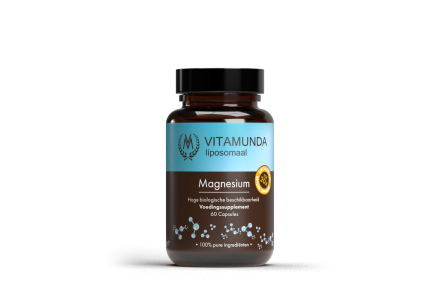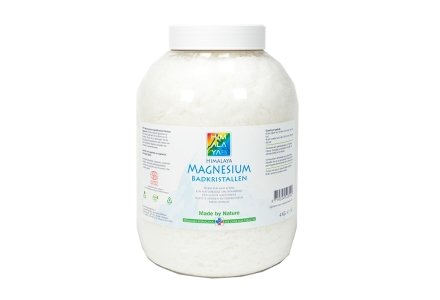
Osteoarthritis is a common form of joint wear that affects millions of people worldwide. It causes stiffness, pain and can hinder daily activities considerably. For many people with osteoarthritis, finding effective ways to reduce symptoms is a constant quest. One of the topics regularly associated with joint health is magnesium. But what is the role of magnesium in osteoarthritis? In this blog, we dive deeper into exactly what osteoarthritis is, and explore whether magnesium can help alleviate symptoms.
What is osteoarthritis
Osteoarthritis, also known as joint wear, is a chronic condition in which the cartilage in the joints gradually breaks down. This cartilage normally acts as a kind of shock absorber, ensuring smooth movements of the joints. When the cartilage thins or disappears, the bones in the joint can begin to rub against each other, causing pain, inflammation and stiffness. Osteoarthritis can occur in any joint, but is most common in the knees, hips, hands and spine. Although the condition is often associated with aging, factors such as obesity, genetics, previous injuries and overuse also play an important role.
Rheumatic complaints
Rheumatic complaints is a collective term for conditions that affect the joints, muscles and tendons. Although osteoarthritis belongs to this group, it differs from other forms of rheumatism. Whereas osteoarthritis is mainly characterized by wear and tear of the cartilage, other rheumatic disorders are often the result of inflammation in the joint tissue. Yet they all have one thing in common: They can cause pain, stiffness and reduced range of motion.
Use of Magnesium to reduce symptoms
Magnesium oil
Magnesium oil is often used as a topical application to support muscles and joints. Although not officially an oil, it does feel oily and can be applied directly to the skin. For people with osteoarthritis, massaging magnesium oil on painful joints can help improve blood flow and reduce stiffness. Although scientific evidence is still limited, some users report experiencing pain relief from this method.
Magnesium tablets
In addition to topical applications, magnesium is often taken as a dietary supplement in tablet or capsule form. Magnesium tablets can help replenish a deficiency in the body, which is important because magnesium is involved in hundreds of processes in the body, including muscle relaxation and for maintaining strong bones. Regular intake can help improve overall well-being and possibly play a supporting role in the well-being of people with osteoarthritis. However, more research is currently needed to further explore these potential benefits.
How magnesium helps with osteoarthritis
Magnesium plays an essential role in maintaining healthy muscles, nerves and bones. In osteoarthritis, magnesium deficiency may worsen symptoms, as this mineral helps relax muscles around the joints and may potentially help support cartilage repair. Although more research is needed at this time, some studies suggest that adequate magnesium intake may help provide support in reducing osteoarthritis symptoms.
Advice from Experts
While magnesium may potentially play a supportive role in the treatment of osteoarthritis, it is important to remember that it should only be one part of a comprehensive treatment plan. Patients with osteoarthritis are advised to consult with their doctor before starting magnesium supplements. A doctor or health professional can help determine the most appropriate form and dosage of magnesium based on the patient's individual needs and health status.
Key benefits of magnesium
Magnesium is essential for the functioning of hundreds of enzymes that affect all kinds of bodily processes. In addition, magnesium has a number of benefits; we list the most important ones below:
Ensures proper muscle function
Because magnesium contributes to the active transport of calcium and potassium ions across cell membranes, it is important for proper muscle function. Whereas calcium and potassium allow muscles to contract or tighten, magnesium allows muscles to relax.
Supports stress and anxiety
Research suggests that stress increases the body's magnesium consumption, which can make you more vulnerable to stress and feelings of anxiety and gloom. Thereby, magnesium is actually needed to cope with stress because it is involved in the body's response to stressors.
Beneficial impact on reducing fatigue and lethargy
Your body needs energy to perform all kinds of physical processes so that our daily activities run smoothly. Magnesium plays a major role in releasing energy in the mitochondria, the energy factories of our cells. Because of magnesium's influence on our energy balance, it may be able to help with fatigue.
How much magnesium do you need
A healthy diet and lifestyle are the foundation of good health. Yet it can be difficult to remain constantly alert to this. Supplements often provide welcome support to optimize our well-being. The recommended daily allowance (RDA) of magnesium varies depending on age, gender and stage of life. For adults, the RDA averages between 300 and 400 milligrams per day. People with osteoarthritis or other chronic conditions can sometimes benefit from a slightly higher intake, but it is important to avoid overdosing. When in doubt, it is wise to seek advice from an orthomolecular therapist.
FAQ
What exactly is magnesium
Magnesium is an essential mineral involved in hundreds of processes in the body, including muscle and nerve function, bone health and energy metabolism. Because the body does not produce magnesium itself, you must get it through food or supplements.
When should you take magnesium right now?
Magnesium can be taken at any time of the day, but it is important to do it at a set time for consistent absorption. Many people choose to take it in the evening because magnesium can help with relaxation and therefore a better night's sleep. If you notice stomach upset, take it with a meal to avoid this.
What are the causes of osteoarthritis?
Osteoarthritis is caused by wear and tear of the cartilage in the joints, often due to aging. Overuse from heavy work, intense sports or being overweight can accelerate this process. Heredity also plays a role: if osteoarthritis runs in the family, you are more likely to get it yourself. Furthermore, previous injuries and prolonged inflammation can damage the joints, increasing the risk of osteoarthritis.
Concluding thoughts
Magnesium can be a valuable supplement for people with osteoarthritis, thanks to its role in relaxing muscles and possibly supporting healthy cartilage. While not a panacea in this particular situation, as part of a broader approach, including a healthy diet, exercise and possibly complementary therapies, it can help reduce symptoms.
At Meditech Europe you will find a wide range of high-quality nutritional supplements. Please visit our website or contact us for more information.









